Sentinel Daily‘s Carrie Gibson caught up with Sisters of Mercy guitarist Ben Christo as the band gears up to tour Australasia – see all the dates below!
As a predominately touring band, how often do you get to relish being home? (past plagues aside) “It’s a really nice balance that you start to cultivate, when you tour regularly – you try to switch it around, rather than, I want to be on tour, or I want to be home, its ‘I’m at home, this is awesome! I love it. And then ‘I’m on tour, this is awesome! I love it’. The thing I love about touring, is just being in a new place everyday and meeting new people with one common thread – these people are really passionate about music, specifically your music and that is the one constant in this ever changing adventure and what a cool constant to have”.
There is such a legacy behind Sisters of Mercy, how did you melt into a band with such a longevity and such a rich history? “What was nice at the start, it was made very clear, early on that I was a member of the band, not a session player. You are now a member of the band. And its a tricky thing, essentially when you’re joining something; a band, with people who are of, essentially, an older generation…. Ok, so what is a band? A band is usually people of a similar age group, from a similar cultural background who have banded together in their local scene. Well this is something that has been thrown together from people from wonderfully disparate backgrounds; Welsh-Cypriots, English, Australian. We’re all encompassing in that sense and I’ve always been made to feel included in it, but it is odd because what I always loved about being in bands was that feeling of comradery; we’ve met locally, we’ve created this thing… and conquer the local area [Laughs] with our collaborative creation and friendship. It was odd for me to be joining something that was so established but working with such established musicians”.
What impact did you want to make, upon joining the band? “Initially I came into the band thinking it was more of a metal band than it was, I focused on a couple of things from their back catalogue and was convinced this is how its going to be. I focused on this key point that I like about them – that it had a harder edge which wasn’t an all encompassing part of their sound. I was trying to play all the time and over complicate things, perhaps trying to do the most impressive thing I possibly can and not necessarily realising and understanding that I was part of a bigger machine. So, learning to dial back over the course of the first few years; really digging in as to where instruments fit into the songs, what guitars I would use. It was really educational. I find that even as I write music now, so much of my development as a song writer has come through working and writing with and for the Sisters, with the whole ‘less is more’, economy with melody, economy with notes, the note placement. So when I write now, I feel like I’ve got a far more developed approach to songwriting, playing and execution”.
And you can’t have that unless you’ve had strong mentors, but also mentors who know their craft and have the experience in developing that craft. “Very true. If you’ve ever tried to teach anybody younger than you, you’re own experience, you can only advise them, but they have to learn for themselves; ‘Oh no, it will be different for me, I’m different’… I remember feeling like that ‘You don’t understand, this is me’ [Laughs] Yeah, ten years later….no its not different, I am the same”. [Laughs]
You’ve been writing for the band for a number of years now, where is the blend between the legacy and the provisional or the progression I guess – how do you all approach writing for Sisters of Mercy in today’s landscape? “It works quite well because Dylan and I grew up listening to the band. So we feel like we understand the handbook, whilst we can still bring our myriad of different influences, that we can bring to the table when writing. Essentially what we strive for is something that we like and something that the fans will like as well. With these newer compositions over the last few years, I do feel like we have been achieving that – from feedback from fans and reviewers. A Swedish review that was quite memorable said ‘It’s as if we have combined the best elements of the band so far and made it into version four’. We combined all the salient elements from the first three eras and had developed them for now. And what I found quite rewarding, we’ve gone out and played these shows this year – and we’re playing all these new songs, and my initial thought was oooh it’s going to be a bit awkward, I mean you play a few new tracks here and there – but there were quite a lot of new songs are people going to be ok with this? But because the songs sounded like this band yet a fresher version, people were really turned onto it”.
Not having released material in the conventional ways, i.e. through a record label – I guess I’m curious; is there a substantial sense of freedom and validation with this? Knowing you’re not accountable to anyone but yourselves. It is not common – to find a band such as Sisters of Mercy, releasing music, yes, but not in those conventional avenues. “It is very rare; what I hadn’t really realised, is that a lot of my favourite bands and albums, I had no idea the amount of much pressure they must have been under from external sources to write in a certain way for the songs to get a certain amount of success ‘oh that one’s too long, cut it – but we worked on it for days – doesn’t matter, get rid of it, it needs to be three minutes long’ or ‘these vocals are garbage, be more commercial’ whatever it was, all these pressures that the bands that I love, that I grew up listening to may well have had to endure, right down to things like, well maybe they didn’t like that album cover, maybe they hated it, but there was this pressure. Maybe it was really stuck in their craw, but it wasn’t up to them. So how much freedom that we’ve had in terms of our writing, we write what we like – and the only barometer, the filtration system I guess, is us and we trust each others judgement because it is based on musical integrity and personal preferences. We consider each others opinions because their motivation is pure, rather than being based on what’s in vogue at the moment”.
The statement made by the band in the nineties, boycotting the record industry – that would have been a scary decision at that time. The band were just on the cusp of success and the only channel to get something out there, was a record deal. Now! Taking the DIY step today, with the internet at your figure tips, a plethora of promotional tools and apps the likes of which not even considered thirty years ago – the original giant leap the Sisters took all those years ago wouldn’t even be an issue now. “Definitely. I think it’s a little challenging for me, as I have one foot in both of those generational ideas. I grew up in an age where there was one TV show, one radio show, one chart and so in order to be successful, you have to be in those. There is a finite amount of space, a finite amount of fame and success, and you’re not getting it unless you’re one of these ten bands showcased in these. It makes me reflect on my Uncle, who doesn’t always ‘get’ what I do, and always asks me ‘when am I going to see you on the Eurovision Song Contest’ [Laughs] that is the only barometer of success! [Laughs] and until I do that, which I probably won’t ever do, It’ll still be ‘Oh he’s doing his little band thing’. [Laughs]
The shift to who is now determining a band’s success is the fans…As it should be.
“In a way it is freeing – and I do think, with the very modest and sparse experience I’ve had as to what it is to be famous; the glimpse I’ve had, the mercifully small glimpse, it is actually quite unpleasant. The shift goes very quickly from the music to other factors, plus you very quickly lose control of how you are presented to the public. And for someone who has quite a high level of anxiety and an over developed sense of responsibility, I find that quite debilitating and quite unsettling. I was playing with a band once, and my association with this band brought some of their, let’s say, more fanatical followers and somebody had created this fake Facebook page of me, of which I, “I” was updating this page with all these bizarre statements, completely at odds with my core belief system and it was horrifying. It went up and disappeared within a couple of days but imagine that on a larger scale with these huge artists and why you can understand that these icons were lead to alcohol and drug abuse and in extreme conditions, even suicide. Because of the mental impact that you don’t sign up for”. Because its selling the rock star persona, the culturally fed dream of being a rock star, they don’t speak of the negatives, the impacts, how cut throat the industry is, how much you have to sell your soul to get a record deal, the sacrifices, the compromises. “You’ve summed it up pretty well – the idea that the only path to success is for everybody to know who you are, where did that come from? Surely, all you need in order to be successful is to have a core group of people who really respect and are passionate about the thing you are passionate about and are willing to allow you to sustain your career to do it”.
Not having been personally involved with the series of events in the nineties, how did you feel about it then and how do you feel about it now? Were you aware of the facts of the day, the protest against Warner. How had it influenced your stance on the industry, would you continue with other bands in the same way? “I wasn’t aware of it at the time, when I joined the band, it was spoken about very rarely, if at all. A healthy mix of both – having that independence, being hands on and realising that you don’t need to be in the charts to be successful. Although, massive congratulations. But, I can be told that someone is in the charts, but I wouldn’t know about it unless they had posted it themselves. I was lucky to work with someone, Kai, and his band is Esprit D’Air – and Kai has done everything completely independently and he has been so successful, he is so inspiring, he understands every single aspect of not only his craft, but the industry. Writing, recording, editing, marketing, website design, merchandise printing, video production. Kai embodies what I aspire to be like, the level of understanding he has and how to work within this complex and over saturated market. I know that his fan base is substantial enough and passionate enough for Kai to do this full time, as his job, his band is his job. My independent band is not my job, I wish it was. I really admire and respect what he does, Kai is proving that it is possible to be an independent artist in 2022 and never have to compromise your ideas. The key to success is a combination of authenticity, profound connection and clear brand identity – brand identity sounds like a pejorative term, but its not, its harnessing your authentic truth as a musician and you make that into your ‘brand’ and all you need to consistently do, is be you”.
I’d gauge success as forty years of consistent, unrelenting, uncompromised and maintaining those core values. “It is impressive, for any band to have that, and the fact that you can still listen to the material from the first era and it still stands up, there’s plenty of bands and music from that era that is so dated, you can’t listen to it. I think there is something about the way that Andrew has written music and the lyrics that have created this simplicity and yet a sophistication to it; this odd little paradox, where it is powerfully simple and yet there is a huge level of intrigue lyrically and within the sound scape that keeps people interested. The last tour we were on, I looked at the front row and there was a lot of people within the eighteen to twenty five demographic, and I’m like ‘how do you even know this band?’. There is something in it that appeals to people discovering it for the first time, whether they be eighteen years old or fifty years old. Whatever has been tapped into by this band has seemed to transcended into the next era”.
The next tour, starting 25th October, just so happens to be Australia, where I’m sure there will be old and new fans alike, what are the anticipations for the string of shows coming up? “I am excited for the Australian tour, and I just have nothing but positive memories of being there, of people’s enthusiasm and general geniality. It will be a nice way to sum up and celebrate the year’s activities, in just seven shows we are going to be bringing together all the best things we’ve done, created and experienced in this very interesting year of 2022”.
THE SISTERS OF MERCY:
AUSTRALIA & NEW ZEALAND TOUR 2022
Tuesday, Oct 25: Powerstation, Auckland
Wednesday, Oct 26: Hunter Lounge, Wellington
Friday, Oct 28: Fortitude Music Hall, Brisbane
Sunday, Oct 30: Enmore, Sydney
Tuesday, Nov 1: The Gov, Adelaide
Thursday Nov 3: Astor, Perth
Saturday Nov 5: Forum, Melbourne




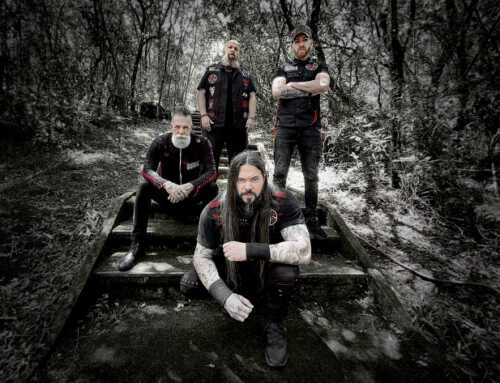
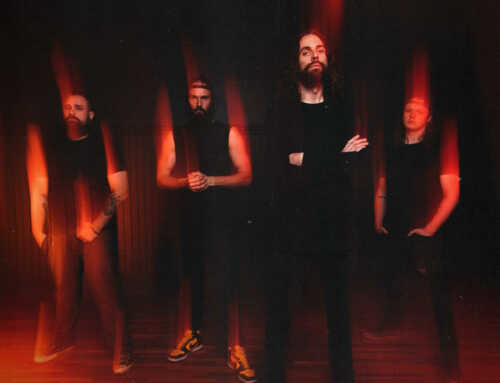
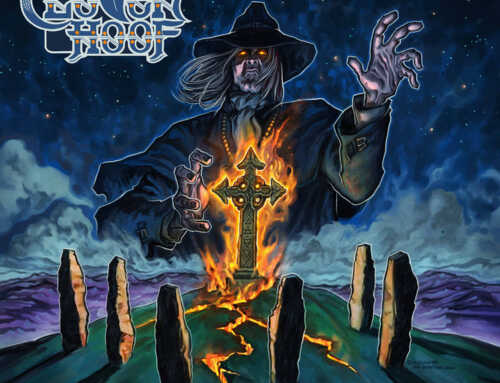
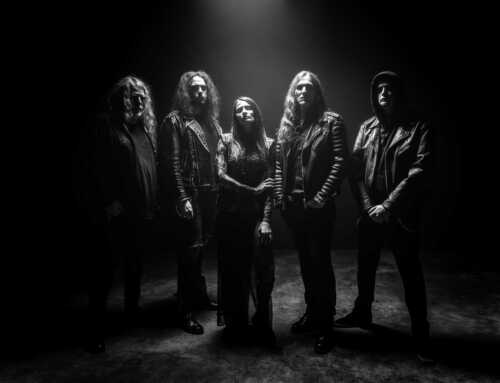
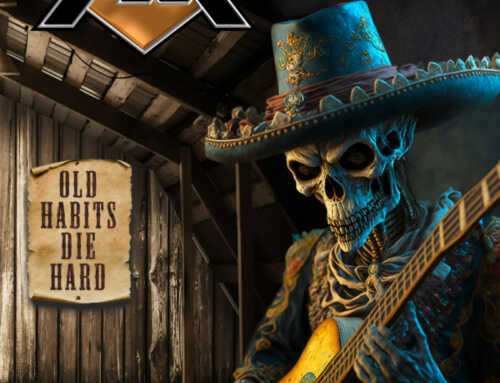
Leave A Comment